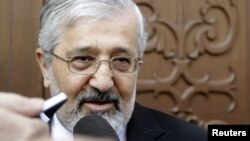Iran is downplaying a report from U.N. inspectors that shows Tehran significantly upgraded uranium at one of its nuclear sites, a move that raises Western concerns that Tehran may have nuclear weapons ambitions.
A report released by the International Atomic Energy Agency (IAEA) on Friday said samples taken at the country's Fordow facility in February showed the presence of uranium enriched up to 27 percent.
Iran declared an enrichment level of 20 percent at the facility, located in an underground bunker.
On Saturday, Iran's IAEA envoy, Ali Asghar Soltanieh, said the higher-enriched uranium was a routine "technical issue" that was being investigated by atomic experts. According to the state-run IRNA news agency, he also said the report, as a whole, offered proof that Tehran's nuclear program was peaceful.
Iran and six world powers will hold a new round of talks on its nuclear program in Moscow next month. They agreed to the new round at the end of talks Thursday in Baghdad.
Diplomats said world powers offered Iran incentives to stop the production of highly-enriched uranium and transfer the material abroad in exchange for nuclear fuel.
Iran countered, saying it wanted an easing of economic sanctions in return for any concession on enrichment work, which Tehran says is meant for medical research and generating electricity.
A report released by the International Atomic Energy Agency (IAEA) on Friday said samples taken at the country's Fordow facility in February showed the presence of uranium enriched up to 27 percent.
Iran declared an enrichment level of 20 percent at the facility, located in an underground bunker.
On Saturday, Iran's IAEA envoy, Ali Asghar Soltanieh, said the higher-enriched uranium was a routine "technical issue" that was being investigated by atomic experts. According to the state-run IRNA news agency, he also said the report, as a whole, offered proof that Tehran's nuclear program was peaceful.
Iran and six world powers will hold a new round of talks on its nuclear program in Moscow next month. They agreed to the new round at the end of talks Thursday in Baghdad.
Diplomats said world powers offered Iran incentives to stop the production of highly-enriched uranium and transfer the material abroad in exchange for nuclear fuel.
Iran countered, saying it wanted an easing of economic sanctions in return for any concession on enrichment work, which Tehran says is meant for medical research and generating electricity.
Some information for this report was provided by AFP and Reuters.





